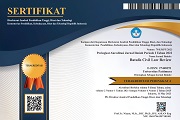Right to Fair Hearing in Employment Disciplinary Proceedings Related to Misconduct in Tanzania
 ), Matilda Lameck(2)
), Matilda Lameck(2)
(1) School of Public Administration and Management Mzumbe University, Morogoro, Tanzania, United Republic of
(2) Faculty of Law, The Open University of Tanzania, Dar es Salaam, Tanzania, United Republic of
 Corresponding Author
Corresponding Author
Abstract
Introduction: The right to fair hearing is one of the principles of natural justice that is constitutionally provided for in Tanzania. Number of principal and subsidiary legislations have been enacted to promote the right to fair hearing in employment proceedings. Despite the legal protection, disciplinary proceedings related to misconduct have been persistently decided without affording the accused the right to a fair hearing.
Purposes of the Research: The study aimed at examining the gap that exists between the law protecting the right to fair hearing and the actual practice in organisations.
Methods of the Research: The study made use of library and field research. Data was collected by using documentary review to collect data from legal documents and published material. Semi-structured interviews were used to collect data from 14 respondents obtained from one of local government authorities in Tanzania.
Results of the Research: The study found that existing law have established standards that are capable of promoting the right to fair hearing in disciplinary proceedings. Further, the study observed that there is a gap between law and practice when it comes to promoting the right to fair hearing in disciplinary proceedings related to misconduct. The gap has to do with failure to adequately comply with procedural fairness during hearing. As per the reviewed literature this is the first study to examine the gap between law and practice relating the right to fair hearing with focus on disciplinary proceedings related to misconduct.Keywords
DOI
10.47268/ballrev.v4i2.1667
Published
2023-12-02
How To Cite
@article{BALLREV1667,
author = {Kelvin Mwita and Matilda Lameck},
title = {Right to Fair Hearing in Employment Disciplinary Proceedings Related to Misconduct in Tanzania},
journal = {Batulis Civil Law Review},
volume = {4},
number = {2},
year = {2023},
keywords = {Right To Fair Hearing; Employment Misconduct; Audi Alteram Partem.},
abstract = {Introduction: The right to fair hearing is one of the principles of natural justice that is constitutionally provided for in Tanzania. Number of principal and subsidiary legislations have been enacted to promote the right to fair hearing in employment proceedings. Despite the legal protection, disciplinary proceedings related to misconduct have been persistently decided without affording the accused the right to a fair hearing.Purposes of the Research: The study aimed at examining the gap that exists between the law protecting the right to fair hearing and the actual practice in organisations.Methods of the Research: The study made use of library and field research. Data was collected by using documentary review to collect data from legal documents and published material. Semi-structured interviews were used to collect data from 14 respondents obtained from one of local government authorities in Tanzania.Results of the Research: The study found that existing law have established standards that are capable of promoting the right to fair hearing in disciplinary proceedings. Further, the study observed that there is a gap between law and practice when it comes to promoting the right to fair hearing in disciplinary proceedings related to misconduct. The gap has to do with failure to adequately comply with procedural fairness during hearing. As per the reviewed literature this is the first study to examine the gap between law and practice relating the right to fair hearing with focus on disciplinary proceedings related to misconduct.},
issn = {2746-8151}, pages = {143--157} doi = {10.47268/ballrev.v4i2.1667},
url = {https://fhukum.unpatti.ac.id/jurnal/ballrev/article/view/1667}
}
Journal Article
Ballard, A, and P Easteal. “Procedural Fairness in Workplace Investigations: Potential Flaws and Proposals for Change.” Alternative Law Journal 5, no. 4 (2018): 1–7. https://doi.org/10.1177/1037969X18772134.
Carrol, H. Constitutional and Administrative Law. 5th ed. Harlow: Pearson Education Limited, 2009.
Chauhan, V. S. “Reasoned Decision: A Principle of Natural Justice.” Journal of the Indian Law Institute 37, no. 1 (1995): 92–104.
Chigozie, M. “The Role off Fair Hearing in the Dispensation of Justice in Nigeria - A Legal Perspective.” International Journal of Innovative Legal & Political Studies 4, no. 4 (2016): 1–10.
Chipeta, D. Administrative Law in Tanzania: A Digest of Cases. Dar es Salaam: Mkuki na Nyota, n.d.
Kiweha, C. E. “Factors Influencing Unfair Termination of Employment in the Private Sector in Tanzania.” Global Scientific Journal 9, no. 10 (2021): 45–67.
LHRC. “Human Rights and Business Report 2020/2021.” Dar es Salaam: Legal and Human Right Centre, 2021.
LHRC. “Human Rights and Business Report 2020/2021: Tanzania Mainland.” Dar es Salaam: Legal and Human Right Centre, 2018.
Loveland, I. Constitutional Law, Administrative Law and Human Rights: A Critical Introduction. 6th ed. Oxford: Oxford University Press, 2012.
Lusewa, L. “The Right to Legal Representation in Disciplinary Proceedings in Tanzania Organizations: Nexus between Law and Practice.” Mzumbe University, 2020.
Mhando, N. E, and N. R Mhamba. “Improving Young Women’s Working Conditions in Tanzania’s Urban Food Vending Sector.” United Nations University World Institute for Development Economics Research, WIDER Working Paper 2021/157, 2021.
Mtemvu, B. “Assessment of Knowledge of Principles of Natural Justice among Disciplinary Committee Members in Tanzanian Organizations.” Mzumbe University, 2021.
Mwita, K. M. “Factors Influencing Data Saturation in Qualitative Studies.” Nternational Journal of Research in Business and Social Science (2147- 4478) 11, no. 4 (2022): 414–20. https://doi.org/10.20525/ijrbs.v11i4.1776.
Nziku, D. K, and J. M Lelo. Sustainable Education and Development, 2021. https://doi.org/10.1007/978-3-030-68836-3_28.
Odeku, K. O. “Precautionary Suspension in the Workplace and the Employees’ Right to Be Heard.” Mediterranean Journal of Social Sciences 4, no. 4 (2013): 797-804.
Parpworth, N. Constitutional and Administrative Law: Core Text Series. 9th ed. New York: Oxford University Press, 2016.| Dublin Core | PKP Metadata Items | Metadata for this Document | |
| 1. | Title | Title of document | Right to Fair Hearing in Employment Disciplinary Proceedings Related to Misconduct in Tanzania |
| 2. | Creator | Author's name, affiliation, country | Kelvin M Mwita; School of Public Administration and Management Mzumbe University, Morogoro; Tanzania, United Republic of |
| 2. | Creator | Author's name, affiliation, country | Matilda Lameck; Faculty of Law, The Open University of Tanzania, Dar es Salaam; Tanzania, United Republic of |
| 3. | Subject | Discipline(s) | |
| 3. | Subject | Keyword(s) | Right To Fair Hearing; Employment Misconduct; Audi Alteram Partem. |
| 4. | Description | Abstract | Introduction: The right to fair hearing is one of the principles of natural justice that is constitutionally provided for in Tanzania. Number of principal and subsidiary legislations have been enacted to promote the right to fair hearing in employment proceedings. Despite the legal protection, disciplinary proceedings related to misconduct have been persistently decided without affording the accused the right to a fair hearing.Purposes of the Research: The study aimed at examining the gap that exists between the law protecting the right to fair hearing and the actual practice in organisations.Methods of the Research: The study made use of library and field research. Data was collected by using documentary review to collect data from legal documents and published material. Semi-structured interviews were used to collect data from 14 respondents obtained from one of local government authorities in Tanzania.Results of the Research: The study found that existing law have established standards that are capable of promoting the right to fair hearing in disciplinary proceedings. Further, the study observed that there is a gap between law and practice when it comes to promoting the right to fair hearing in disciplinary proceedings related to misconduct. The gap has to do with failure to adequately comply with procedural fairness during hearing. As per the reviewed literature this is the first study to examine the gap between law and practice relating the right to fair hearing with focus on disciplinary proceedings related to misconduct. |
| 5. | Publisher | Organizing agency, location | Faculty of Law, Universitas Pattimura |
| 6. | Contributor | Sponsor(s) | |
| 7. | Date | (YYYY-MM-DD) | 2023-12-02 |
| 8. | Type | Status & genre | Peer-reviewed Article |
| 8. | Type | Type | |
| 9. | Format | File format | |
| 10. | Identifier | Uniform Resource Identifier | https://fhukum.unpatti.ac.id/jurnal/ballrev/article/view/1667 |
| 10. | Identifier | Digital Object Identifier | 10.47268/ballrev.v4i2.1667 |
| 11. | Source | Title; vol., no. (year) | Batulis Civil Law Review; Vol 4, No 2 (2023): VOLUME 4 ISSUE 2, NOVEMBER 2023 |
| 12. | Language | English=en | en |
| 13. | Relation | Supp. Files | |
| 14. | Coverage | Geo-spatial location, chronological period, research sample (gender, age, etc.) | |
| 15. | Rights | Copyright and permissions | Copyright: Authors who publish their manuscripts in this Journal agree to the following conditions: 1. The copyright in each article belongs to the author, as well as the right to patent. 2. Authors are able to enter into separate, additional contractual arrangements for the non-exclusive distribution of the journal's published version of the work (e.g., post it to an institutional repository or publish it in a book), with an acknowledgment of its initial publication in this journal. 3. Authors are permitted and encouraged to post their work online (e.g., in institutional repositories or on their website) prior to and during the submission process, as it can lead to productive exchanges, as well as earlier and greater citation of published work. 4. Authors have the right to self-archiving of the article (Author Self-Archiving Policy)
Licence : Batulis Civil Law Review Journal is disseminated based on the Creative Commons Attribution-NonCommercial 4.0 International license terms. This license allows anyone to copy and redistribute this material in any form or format, compose, modify, and make derivatives of this material for any purpose. You cannot use this material for commercial purposes. You must specify an appropriate name, include a link to the license, and certify that any changes have been made. You can do this in a way that is appropriate, but does not imply that the licensor supports you or your use.
|
Copyright (c) 2023 Kelvin M Mwita, Matilda Lameck

This work is licensed under a Creative Commons Attribution-NonCommercial 4.0 International License.

 : 2895 times
: 2895 times Download : 3447 times
Download : 3447 times














